We get calls every week from people wanting to know the optimum shipping container sizes for their household goods. Sometimes they end up purchasing a used container from us in cargo worthy condition they can resell at their destination. However, others prefer to use a removal company because they have enough on their minds.
Most of the containers we see on ocean-going ships (and occasionally falling off) are either 20 ft. or 40 ft. ones. However, there are other smaller and larger ones in the below list:



The most popular shipping container sizes for household moving are 20 ft. and 40 ft. ones. As a general rule of thumb:
However, it’s rare to find a family needing exactly 30 or 65 cubic metres. Hence many people relocating share containers with others moving to the same location.
Your shipping agent will help you calculate the optimum size. You may find leaving the leather lounge suite behind achieves a greater saving than the cost of a replacement one overseas.
If you pay for a ‘full container load’ (FCL) you don’t have to ‘stand in a queue’ while your household goods travel somewhere else first. However, a ‘less container load’ (LCL) can work out cheaper if you don’t mind waiting a little longer.
Shipping household goods from Durban to the UK can cost between R100,000 and R150,000 depending on container size, insurance costs, final destination etc. Cape Town to Sydney can cost between R150,000 and R200,000. You could have more money in your pocket towards setting up your new home by making the right decision when choosing between shipping container sizes wisely.
It can be a false economy to purchase a container office outright for a short contract away from base. That’s because it’s not always easy to provide the assurances the reseller market needs. Most purchasers prefer to source their rental office containers from reliable suppliers including Almar Container Group. We supply our intermodal shipping containers with rock solid warranties and all your questions answered.
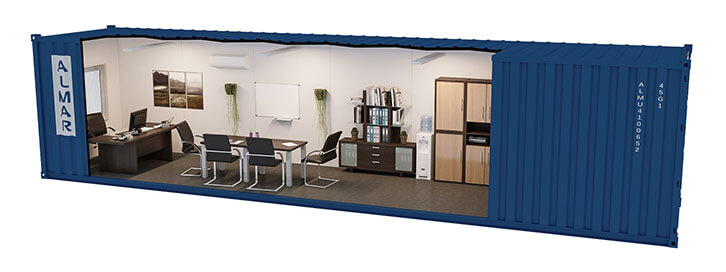
We need flexibility above most things in a dynamic economy. What seemed the ideal location may no longer prove to be the right decision as a project rolls out. Intermodal shipping containers are designed with the intention of moving around. They have secure lifting points at all eight corners and are strong enough to support far more weight than a fitted office.
Hence intermodal shipping containers make perfect temporary office accommodation. Moreover, our rental office containers may come complete with electrical, plumbing and drainage reticulation. All you need do is connect them with the necessary services. How hassle-free is that, compared to erecting a prefabricated building that may not disassemble, move, and reassemble again properly?
Find more answers to your questions here.
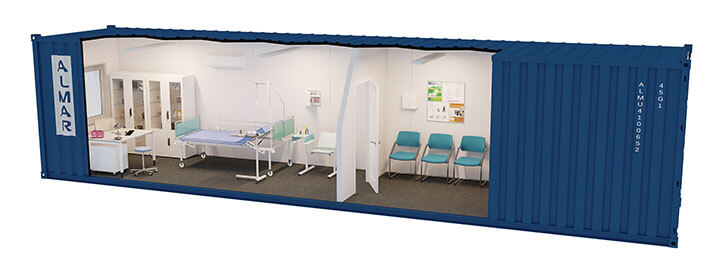
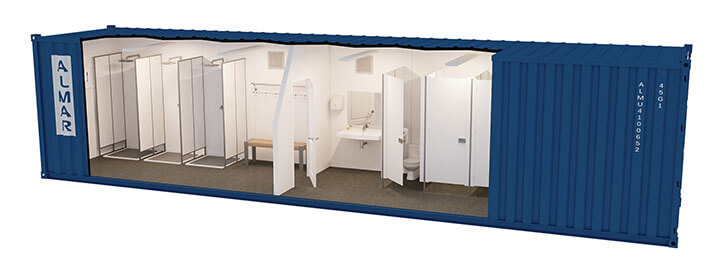
We extend the life of intermodal containers by finding new uses for them. We believe in recycling things because new construction comes with carbon costs. Our robust, modular range includes:
Speak to Almar Container Group in confidence for all your rental office container solutions soon.

Almar Kenya has been commissioned to create four bespoke functional gym units from standard 20-foot dry containers for anti-poaching rangers to use. Three will be located in wildlife conservancies in Kenya, while the fourth is to be transported to Tanzania, and all four will provide an exciting opportunity for anti-poaching rangers to keep fit in the field.
The project was initiated by the Save the Rhino charity and 51 Degrees Ltd, a Kenyan company that trains rapid-response anti-poaching units across East Africa in helicopter procedures, reactive operations, area searches, and medical skills.
The design of the converted containers’ functional gym equipment will ensure that the rangers are able to improve their strength and overall fitness while in remote locations. The equipment in each unit consists of a series of bolted frames with pull-up bars, as well as removable dead-weight brackets and a larger frame for rope climbing at one end.
One of the converted containers has already been set up in the main rangers’ camp at Borana Conservancy in Laikipia County, Kenya. Two more are destined for Ol Jogi and Lewa Conservancies in the same region. A fourth will soon be heading for Tanzania where it will be utilized by the Singita Grumeti Fund’s team of rangers.


During the past four decades, Kenyan organisations and associations have been doing everything possible to save the black rhino (Diceros bicornis) from extinction. In 1970 there were 20,000 rhinos in the country, but as a result of poaching, this number fell to less than 280 in the 1980s. One of the first initiatives was the formation of the Association of Private Rhino Sanctuaries in Laikipia that was mandated by the Kenya Wildlife Service to represent the interests of those in the private sector who were working towards conservation of rhinos.
After the dramatic decrease in the numbers of rhinos by the 1980s, Kenya was hit by another surge in rhino and elephant poaching in 2012 and 2013, that led to the loss of more of these animals than at any time during the past 20 years. As a result, a new wildlife law was introduced allowing the courts to impose life imprisonment for convicted poachers. But, while poaching stats dropped, the killing continued, and earlier this year it was reported that convicted poachers in Kenya could face the death penalty.
The Kenyan authorities have also introduced a high-tech anti-poaching technique that involves sniffer dogs trained to identify air samples of rhino horn and ivory. These dogs are also used to find stolen livestock, property, and even children.
The Borana Conservancy is one of the newest conservancies for rhinos and since black rhinos were reintroduced to the area in 2013, it has been proven to be one of the most successful. It is relatively close to the Ol Jogi Conservancies as well as Ol Pejeta and the Solio Game Reserve, but Lewa is its closest neighbour.
Borana and the Lewa Wildlife Conservancy work closely together with additional combined efforts from Kenya Wildlife Service and the Kenya Police. While a primary focus is on fighting the threat of poaching and protecting the wildlife in the local conservancies, they also assist when there is road banditry, cattle rustling, and even inter-tribal conflict.
They report that there has been no poaching of rhino in the Lewa-Borana area in the past five years and that the numbers of illegally killed elephants have decreased significantly during the same period of time.
The Singita Grumeti Fund carries out community development and wildlife conservation in the western corridor of Tanzania’s legendary Serengeti ecosystem. An area that experienced rampant poaching and uncontrolled poaching less than two decades ago, the Fund is responsible for one of Eastern Africa’s greatest conservation success stories.
“Not only is Almar extremely grateful to have worked on this exciting and creative product, we are also proud to help such esteemed clients with their efforts in ensuring the preservation and security of Africa’s most precious wildlife.”


A beautifully created shared office space right in the heart of Nairobi, Kenya, Ikigai has attracted people from a cross-section of industries who value interaction and the possibility of collaboration with others but want to work in a highly professional environment. Based on a Japanese concept that means "a reason for being," Ikigai is such a popular office venue, it has been expanded with converted mobile containers to meet the demand.
Founded by two passionate entrepreneurs, Wachuka and Nyambura, who believe in the collective greatness of the community, Ikigai is located on a beautiful property that boasts a huge, rambling, old house and lush green gardens. They lease the property and are bound to keep the house in its original form. They may not build any permanent structures on the site, which is why they have opted to expand using mobile containers that may be relocated later if need be.
Rather than renting out rooms, they offer different types of membership that cater to the varied needs of individuals looking for reliable but flexible workspace. For instance:
All forms of membership offer high-speed Wi-Fi and there are communal areas in addition to the meeting spaces and boardrooms. Roasted Truth, an artisan barista-operated coffee bar established in one of the many converted shipping containers, and its adjacent coffee deck, is another perk for members.


When the owners of Ikigai decided to expand their office space, there were several major challenges they had to consider, including the fact that permanent structures were not acceptable. Aesthetics are important to the Ikigai team, and it was essential that if mobile containers were going to be used, these had to blend with the existing environment.
Almar Container Group, which has operated in Kenya since 2010 and is now the country’s largest supplier of steel containers to the end-user market, was approached to undertake the project. One of the benefits would be the speed of delivery and Almar’s ability to move the mobile containers to another site later if required.
First, they had to identify suitable areas for converted shipping containers. Then they had to design both a workable layout and container design based on this configuration. Ikigai needed big glass windows and doors incorporated in the design to facilitate both light and airflow. Almar’s designers achieved this by using double-glass sliding doors and lovely big tilting windows. The containers were also well insulated.
PVC tiled flooring was chosen, and down-lighters were installed to meet the client’s brief for smart, modern, and functional office spaces. The exterior walls of the containers were covered with timber cladding that would blend with the garden environment and surrounding spaces. Ultimately, the project shows how effectively converted shipping containers can be used in an upmarket residential area.
Whether you want accommodation for offices or boardrooms in upmarket converted shipping containers, mobile containers for traditional industrial office use, or steel containers that can be converted into living accommodation, Almar can help fulfil your needs in Southern Africa or the Middle East. Call us to discuss your needs or request a shipping container cost.
The sub-Saharan Africa rail revitalisation project that is rehabilitating and upgrading vital railway networks in Southern African Development Community (SADC) is surging ahead using storage containers for rent, particularly in the north-south corridor that runs from Durban through Zimbabwe and Zambia to the United Republic of Tanzania and the Democratic Republic of Congo (DRC).
The project incorporates two other corridors, east-west that links Namibia, Botswana, and Lesotho to South Africa, and the Maputo corridor that links Swaziland and Mozambique to South Africa.
Not only will rail revitalisation improve the quality of rail networks through the region, enabling mining and other industries to transport more steel containers by rail more quickly, safely, efficiently, and economically, but it also represents a paradigm shift in the way SADC railways have been operating. Instead of countries in sub-Saharan Africa working in isolation, the project will drive economic growth through the region and develop what will become a single, unified railway system.
The rail revitalisation project is driven by national governments and as such, represents a substantial investment in the region. It is a mammoth project primarily because the rail network has been poorly maintained throughout the region for a very long period of time.
Being part of the rejuvenation of this incredibly important logistics backbone to Africa has been a long-standing dream for the team at Almar Container Group, a leader in the global steel containers industry.
As a South African Department of Transport green paper published in 2015 stated, the rail transport sector has had “mixed fortunes” since it was inaugurated way back in 1860. Even though a rail network offers much more efficient transport solutions than road transportation, it has been substantially under-utilised over the past few decades. As a result, one of the major challenges is the “aging, deteriorating or obsolete” state of the existing network. The first project envisaged in the green paper was to promote efficient movement of goods through “industrial corridors” that connect coalfields to power stations as well as the expansion of coal and iron-ore rail lines, and expansion of ports – which is happening now.



In recent months, the South African government as well as other SADC governments have become increasingly aware of the incredible potential railways have to inject into the economy of the region. For instance, Zambia has implemented a target of 30 percent of all mining-related exports travelling via rail. State-owned entities in various countries that previously maintained tight control over rolling stock have begun to ease up and allow private operators the space to drive the efficient use of the rail infrastructure. And finally, shippers of cargo are starting to buy into the opportunity with the initial trial shipment showing incredible efficiencies.
Almar has receiving and collection facilities for steel containers in South Africa, Zimbabwe, Zambia, Tanzania, Kenya and Uganda, which has enabled the company to play a key role in the final roll-out of the rail solution, allowing shippers even more efficiency with one-way rentals. What this means is that there is never any need for shippers to pay for empty returns of mobile containers.
The storage containers for rent service offered by Almar is operational in the north-south corridor, in South Africa, Zimbabwe, Zambia, and Tanzania, where various drop-off points are located. The company has more than 150 of its 20ft containers available along this route. Please contact us for container rental prices.
Shipping containers are versatile “boxes” that that can be used as-is, with just a few fixtures and fittings inside, for innovative pop-up shops. Instead of tying yourself into a typically lengthy, and relatively costly lease for premises, shipping container rental is an effective alternative that gives you freedom too.
Take your pop-up shop on the road. Follow the crowds and start trading anywhere, anytime – within reason, depending on local bylaws and licensing requirements. Park off for a limited time and lock up overnight to keep your stock safe and secure.
Pop-up container shops are, quite literally, popping up all over the world, offering affordable temporary shop space for a vast range of businesses, including restaurants and coffee shops.
You will find converted container pop-up shops in all major cities, including many South African city centres. Many house individual retail business enterprises, while there are also a number of innovative shopping malls created with used containers. These take shipping container rental possibilities to a whole new level.
The trend first started in the early 21st century, with maverick entrepreneurs and under-financed start-ups recognizing the enormous potential of storage containers for rent. Perhaps the best marketing exercise for shipping container pop-up stores was the launch of the now hugely popular Boxpark pop-up shopping mall in Shoreditch, East London, UK in 2011. Made from used shipping containers that were stripped and refitted, it provides 40 pop-up spaces that house restaurants, cafes, fashion outlets, galleries, and other retail businesses. There is now a second Boxpark in Croydon, and a third is scheduled to open in Wembley late 2018.
Of course, while the Boxparks can be easily dismantled, they don’t offer the mobile option.
South Africa’s first pop-up shopping centre was opened in Johannesburg in 2015. This comprises 27 customized shipping containers but, like Boxpark, does not offer the opportunity for mobility.
Shopping mall options aside, pop-up stores may be housed in customized containers that incorporate doors and windows, and various typical shop-fitting elements, including counters and facilities for storage. Often, a container will be used as the base of a pop-up operation with some sort of constructed addition providing a different type of space. So, for instance, a pop-up restaurant might operate out of a container, while an adjacent patio or glass-enclosed area is used for seating.
The other obvious option is to look at storage containers for rent with the view to trading from them and also using them to lock up equipment and stock after hours. In this instance, low container rental prices will impact positively on your bottom line. Because no customization is required, this will also potentially add to profits. The other benefit of this type of shipping container rental is that the container can be used for a short period of time if required. Since there’s no major investment in terms of shop fitting or additional construction, it really is a true pop-up solution for any retail business.
Almar Container Group specializes in container rental services to meet every possible need from international transportation of goods across continents and oceans, to storage rental that will meet the needs of literally any type of pop-up shop.
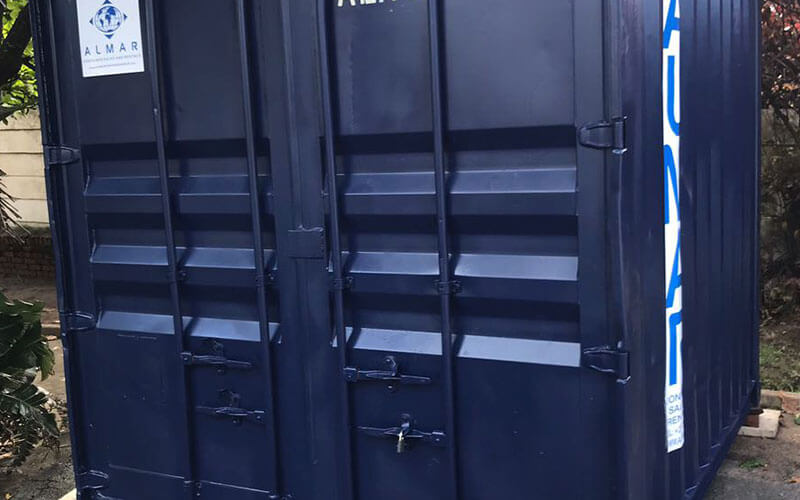
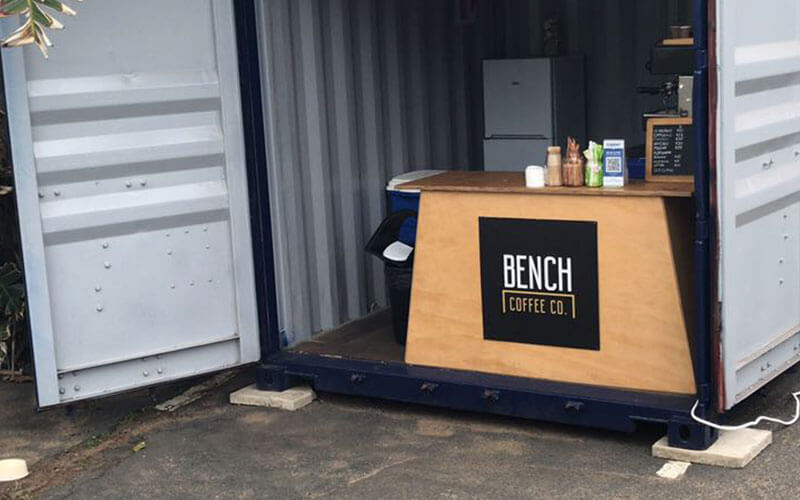

Last Christmas, the KwaZulu Natal-based Bench Coffee Co. set up a pop-coffee shop at the beach. They opted for a 3-m container rental and fitted out the “shop” with little more than a trendy wooden counter and the appliances they needed, including a fridge. Of course, they needed electricity, which was provided by an extension cable. Instead of operating from a table or a caravan, they had a secure environment in which to operate and provide customers with the kind of coffee products they are known for.
Bench Coffee Co.’s pop-up outlet was a hit. People flocked for coffee and surfers would ask them to look after their car keys while they were in the water!

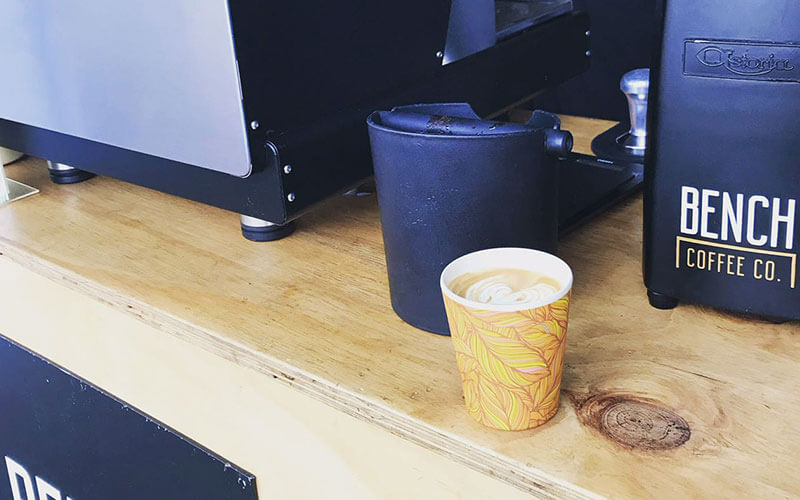
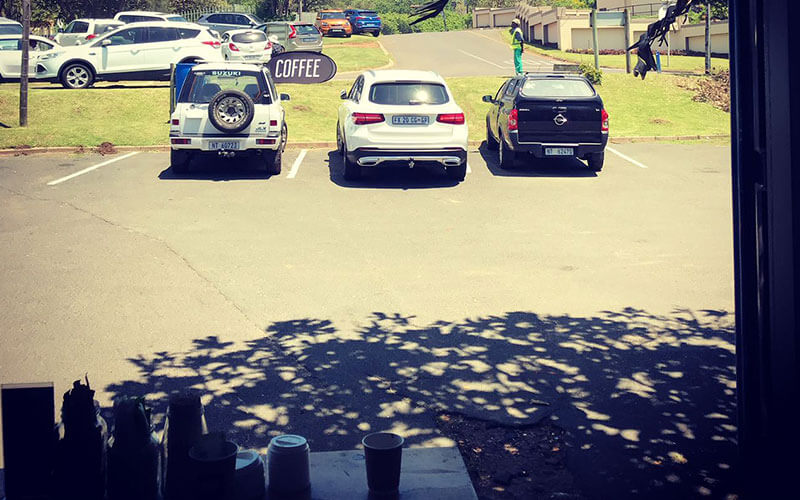
If you’d like to explore the option of a pop-up shop, contact Almar for container rental prices and advice. You don’t have to live in Durban or any other part of KZN, Almar operates in southern and eastern Africa and the Middle East and can provide a superior container hire service virtually anywhere in the world. Call us today.
For many growing businesses, safe and secure storage for documents, inventory, materials and just about everything that you need close at hand is a real challenge as the initial space you move into just becomes too small too quickly! Onsite storage container rental is the perfect solution, as they are not only super quick to have on site, they are also cheap to rent and no long-term commitments are required.
Whether you need to stock up on inventory for the Christmas rush, or you are just growing out of your current space and need a secure storage solution, onsite storage containers are the perfect option for you.
We have recently completed the manufacture of our new storage containers. This picture shows the last few available which are waiting to be deployed:

Storage containers come in three main sizes, 3m containers (10ft), 6m containers (20ft) and 12m containers (40ft). The cubic capacities of the 10ft, 20ft and 40ft containers are 15mᶟ, 30mᶟ and 70mᶟ respectively. All containers have an external width of 2.4m.



Almar Containers have storage containers in various parts of the world including Cape Town, Durban, Johannesburg, Port Elizabeth, Mombasa, Nairobi, Dar es Salaam, Walvis Bay, Dammam and Dubai... ready and available for immediate hire!


Dabaab
Container Conversion
The Centre for Victims of Torture (www.cvt.org)
CVT needed to mobilise urgently to assist with the refugee crisis in Dabaab, which is a remote region of Kenya bordering Somalia. As CVT had no personel on the ground in Dabaab ahead of the project, they had no way of building or assembling a structure before they needed to move in.
Almar East Africa were able to design, manufacture, deliver and install world class accommodation modules for the CVT team within a matter of weeks, including laminate flooring and air conditioning. The team was able to move into the en-suite comfortable accommodation and begin their much-needed work without the worry of having to arrange accommodation and site preparation. We took care of it all for them.






When Parbat Siyani Construction was awarded a large tender for a major construction project involving the prestigious City Lodge Hotel in central Nairobi, they decided they would need container offices to be able to accommodate the expert team leading the project.
Registered by the Kenyan Ministry of Roads and Public works as a category A class of contractors, Parbat Siyani Construction opted for Almar container offices that would address all their needs. These ranged from vital security to absolute comfort within a budget that met their needs.
Parbat Siyani Construction needed a site office with top quality facilities that would cater for the many developers and engineers working on the newly awarded project. Additional challenges included the fact that:
Well known for their ability to provide high-quality remote site accommodation and container offices in Africa and the Middle East, Almar’s project team in Nairobi seized the opportunity to meet the Parbat Siyani challenges.
Because shipping containers are available in different sizes, and they can be used as modular units, the Almar design team opted to use a selection of different sizes, some of which were used together to form a simple but effective double-storey configuration. In all, the project incorporated a total of about eight containers.
Doors and windows were fitted before the container offices were moved to the site. The layout and double-storey design of the containers ensured that they took up minimal ground space, which in turn would guarantee there would be no interruption once development and construction started. The quality finishes inside the container offices included laminate flooring, high-quality lighting, and air conditioning, ensuring that the working environment really was world-class.
In addition to the site offices, boardrooms, kitchen, and essential ablution areas in the Kenyan container offices, the Almar solution for Parbat Siyani also incorporated a critical access-control container. This shipping container was designed and located so that security staff could search anyone before they were given permission to enter the site. All the container offices were also provided with robust security windows and doors for added safety.
Whether you need world-class container offices in Kenya, Uganda, South Africa, or the Middle East, Almar can help you fulfil your unique on-site needs. Contact us to see what we can do for you and your company.